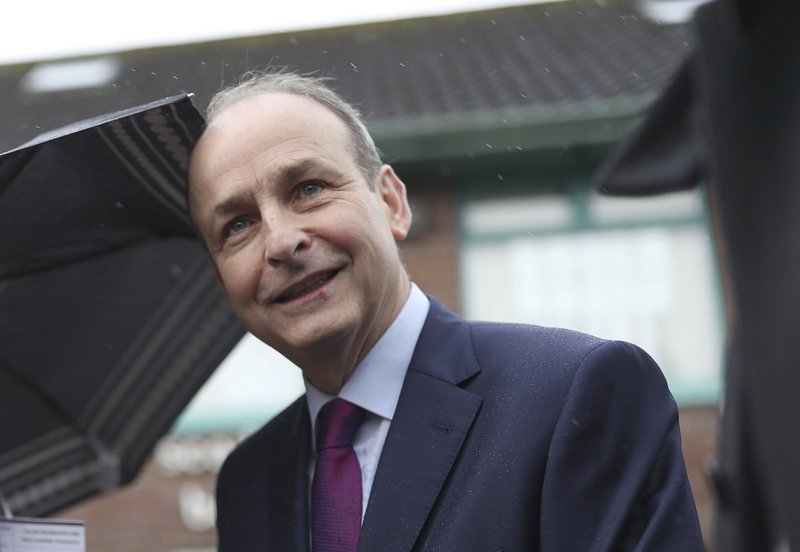DUBLIN -- For the first time since Ireland won independence from Britain a century ago, the Irish Republican Army-linked party Sinn Fein has taken the largest share of votes in an election.
In the results announced Monday, the left-wing nationalist party beat both Fianna Fail and Fine Gael, the larger centrist parties that have governed Ireland for decades. Fianna Fail is Irish for "Soldiers of Destiny," while Fine Gael translates as "Tribe of the Irish."
Ireland braced for weeks of political uncertainty as Saturday's vote was essentially split three ways, complicating the upcoming negotiations on forming a government.
Sinn Fein, which means "We Ourselves," received 24.5% of the first-preference votes. Fianna Fail received 22.2% of the votes. Fine Gael, the party of incumbent Prime Minister Leo Varadkar, got 20.9%.
"I think it's a mess, to be honest with you," said Pat O'Toole, a public sector worker in Dublin. "I think we're going to be in a situation again where we are not going to be able to form a stable government in this country. I really don't know what's going to happen."
Sinn Fein's left-wing proposals for tackling Ireland's housing crisis and creaking health care system proved a powerful draw for young voters in a country that is still dealing with aftershocks of the 2008 global financial crisis, which hammered its debt-driven "Celtic Tiger" economy.
Vote counting resumed Monday to fill all the seats in the 160-seat Dail, the lower house of Ireland's parliament. Ireland uses a proportional-representation system in which voters rank candidates from first to last, with the lower preferences of elected or defeated candidates redistributed among their rivals.
With more than three-quarters of the seats in parliament filled, Sinn Fein had taken 37, Fine Gael 29 and Fianna Fail 27. No party is likely to reach the 80 seats needed for a majority, making some form of coalition inevitable.
But both Fianna Fail and Fine Gael said before the election that they would not go into a coalition with Sinn Fein because of its links to past violence.
Varadkar said Fine Gael's stance was unchanged.
"I say what I mean, and I mean what I say," he said Monday.
But as the scale of Sinn Fein's surge became clear, Fianna Fail leader Micheal Martin said, "I listen to the people. I respect the decision of the people."
Talks among the parties are likely to take weeks, though some hope a new government can be formed by St. Patrick's Day on March 17, when the Irish prime minister traditionally visits the White House.
Sinn Fein leader Mary Lou McDonald suggested her party could try to form a government with the support of independents and smaller parties such as the Social Democrats and Labor.
"We want to talk to anyone who is interested in delivering a program for government, that is about getting to grips with the housing crisis and solving it, getting to grips with the crisis in health and giving families and workers a break and giving a new lease of life to government," she said.
The IRA was responsible for murders, bombings and other violence during decades of violence known as the "Troubles" in Northern Ireland. More than 3,500 people were killed in conflict between forces that sought to reunify Northern Ireland with the Republic of Ireland and those who wanted Northern Ireland to remain part of the U.K.
However, supporters of Sinn Fein point out that many younger voters have no memory of the Troubles. It has been more than 20 years since Northern Ireland's 1998 peace agreement and 15 years since the IRA announced the end of its violent campaign. Sinn Fein already sits in government in Northern Ireland as part of a power-sharing arrangement created by the peace process.
Sinn Fein's triumph could have implications for Ireland and the U.K. The party's struggle for a united Ireland was on the back burner during the election, but the party is calling for a referendum on reunification within five years.
That is not something an Irish government can deliver without the support of Britain and Northern Ireland. But Britain's exit from the European Union -- and the desire of some Northern Ireland voters to remain in the EU with Ireland -- looks likely to nudge Northern Ireland's economy closer to that of its southern neighbor, and could increase pressure for a vote on unification.
In London, Prime Minister Boris Johnson's spokesman, James Slack, said the U.K. was "following the results of the Irish election carefully," adding that "the close relationship between the U.K. and Ireland will continue regardless of the election result."
NW News on 02/11/2020
